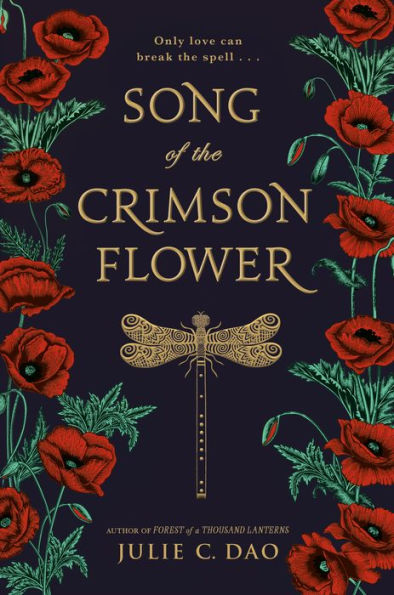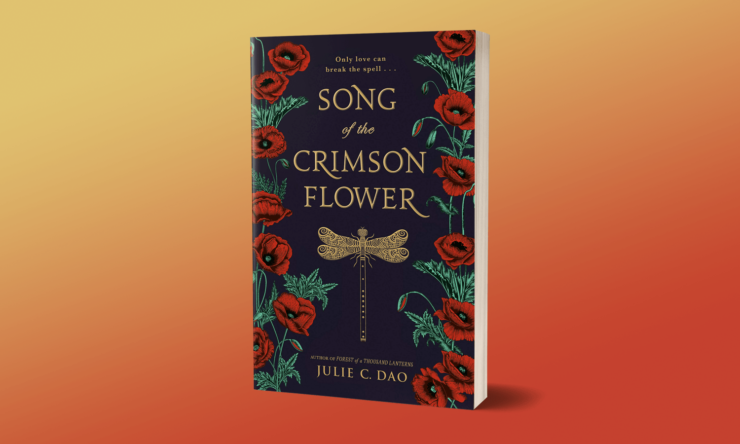There is so much to love in every Julie C. Dao novel: the gorgeous worldbuilding, the atmospheric fantasy, the high-stakes plot — but my favorite element will always be her unapologetically complex characters. While Dao uses fairytale as her launchpad in the Feng Lu novels, her characters are consciously crafted as anything but archetypal. The immersive, lovely Song of the Crimson Flower revisits favorite characters from Kingdom of the Blazing Phoenix while centering on a new, compelling cast.
Song of the Crimson Flower is set eight years after Phoenix leaves off. It continues the narrative of the world of Feng Lu, now prospering under the rule of Empress Jade, though the dark, entwining threats of black spice and bloodpox cast a rising shadow on her kingdom. Crimson Flower can be read and loved as a standalone, or prior to reading the Rise of the Empress books. However, as a reader who adores Forest of a Thousand Lanterns and its sequel, it was deeply fulfilling to return to Feng Lu and revisit the characters I love, exploring their roles in the next phase of their world.
This story is a dual POV, alternating between the perspectives of Lan, a privileged nobleman’s daughter, and Bao, an orphan who spent his childhood shunted between caretakers before finding an apprenticeship to a physician. Lan is engaged to Tam, the son of another noble family. She’s been in love with him for years, and though he hasn’t been very receptive to her advances in person, lately, he comes to play his flute and woo her from his boat, late at night, and she’s enamored at his romantic gestures.
After Tam postpones the wedding again and again, Lan finds out the truth—he had no intention of obeying his family and keeping their betrothal. His family had been paying Bao to pose as him to forestall disrespecting Lan’s parents.
Lan is understandably furious and humiliated at this Cyrano-esque deception, lashing out and insulting Bao. All this time, however, Bao himself has truly been smitten with Lan, idealizing her since they were young. Too shy to ever talk to her himself, he hated hurting her, but he needed the money and hoped the scheme could work in his favor.
Heartbroken, Bao flees at her harsh words, setting out to seek his fortune elsewhere—but a chance encounter with the river witch Huong leaves him suffering under a deadly curse. Huong bears a deep grudge against his mother, who may not be dead after all, and believes she is using Bao as a pawn against her. She binds Bao to his flute, rendering him nearly a ghost, and makes it so only the touch of the person he loves, who loves him in return, can break the spell, though that love will also bind them to the curse. If no declaration of love is made before the full moon, the curse will become permanent. Huong expects that this will be Bao’s mother, and as she believes Bao’s mother incapable of true love, she means this as a fearsome punishment.
Lan, meanwhile, has been berating herself for her cruel behavior towards Bao. The initial heat of betrayal cooling, she can understand that he was pushed into his actions, and it was really Tam and his family who caused her hurt. She also begins to reframe her relationship with Bao, after hearing his confession and realizing that she had been idealizing Tam all along. When Lan discovers Bao’s predicament, she feels not only remorse, but also a deeper desire to help him on his quest to find his mother and break the curse.
As they journey across the continent, they encounter Commander Wei and Wren of the Crimson Army, characters that the readers of Dao’s other novels will be excited to revisit. Lan and Bao end up embroiled in a clash of rival nations, centered on the illegal drug, black spice, which is being used ruthlessly by the vicious Mistress Vy, leader of the rebellious Grey City. But there is more to Vy’s story and motivations than anyone, including Empress Jade, realizes–and Bao’s life isn’t the only one at stake.
Buy the Book


Song of the Crimson Flower
Dao is a master of brilliant, layered characters, and they shine here. Lan is spirited and passionate, desperate for adventure and coming to understand the depths of her privileges. Bao is a particularly beautiful character, compassionate and romantic but strong-willed and clever. Even the witch who cursed Bao had more reason than she let on, and Dao’s satisfyingly rendered cast continues to surprise throughout the tale.
Lovers of the Rise of the Empress duology may note that though Mistress Vy is a compelling antagonist and perfectly suited to this story, even by her own admission in the novel–she doesn’t share the bite of Xifeng’s villainy. Dao does deftly explore the messy stakes of black spice and bloodpox through Vy, delving into the tangles of leadership and the steep risks that must sometimes be taken to save a life. Still, the plot of Crimson Flower reads lighter than that of Dao’s first two novels. It hits more of the familiar beats of a romantic fairytale quest than the deep political intrigue of its predecessors, though there is no less magic.
Dao deconstructs the dangers of idealism and idolatry when it comes to love, whether it be romantic or familial. Crimson Flower understands that all true love is earned, built on trust and mutual goals, which not only makes for compelling, fresh intercharacter dynamics but leads to truly fulfilling romantic storylines. It’s a joy to read a varied East Asian cast, rife with ambitious women and compassionate men, all full of intricate wants and motivations.
Song of the Crimson Flower deepens the brilliant, inviting world of the first two novels, but makes for a beautiful self-contained fairytale standalone. Immersive and vividly realized, Dao’s latest is a thoroughly satisfying romantic fantasy.
Song of the Crimson Flower is available from Philomel Books.
Maya Gittelman is a queer Pilipinx-Jewish diaspora writer and poet. Their cultural criticism has been published on The Body is Not An Apology and The Dot and Line. Formerly the events and special projects manager at a Manhattan branch of Barnes & Noble, she now works in independent publishing, and is currently at work on a novel.










